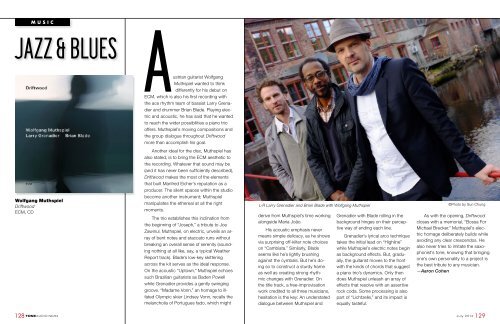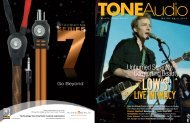You also want an ePaper? Increase the reach of your titles
YUMPU automatically turns print PDFs into web optimized ePapers that Google loves.
MUSIC<br />
Jazz & blues<br />
Austrian guitarist Wolfgang<br />
Muthspiel wanted to think<br />
differently for his debut on<br />
ECM, which is also his first recording with<br />
the ace rhythm team of bassist Larry Grenadier<br />
and drummer Brian Blade. Playing electric<br />
and acoustic, he has said that he wanted<br />
to reach the wider possibilities a piano trio<br />
offers. Muthspiel’s moving compositions and<br />
the group dialogue throughout Driftwood<br />
more than accomplish his goal.<br />
Wolfgang Muthspiel<br />
Driftwood<br />
ECM, CD<br />
Another ideal for the disc, Muthspiel has<br />
also stated, is to bring the ECM aesthetic to<br />
the recording. Whatever that sound may be<br />
(and it has never been sufficiently described),<br />
Driftwood makes the most of the elements<br />
that built Manfred Eicher’s reputation as a<br />
producer. The silent spaces within the studio<br />
become another instrument; Muthspiel<br />
manipulates the ethereal at all the right<br />
moments.<br />
The trio establishes this inclination from<br />
the beginning of “Joseph,” a tribute to Joe<br />
Zawinul. Muthspiel, on electric, unveils an array<br />
of bent notes and staccato runs without<br />
breaking an overall sense of serenity (sounding<br />
nothing at all like, say, a typical Weather<br />
Report track). Blade’s low-key skittering<br />
across the kit serves as the ideal response.<br />
On the acoustic “Uptown,” Muthspiel echoes<br />
such Brazilian guitarists as Baden Powell<br />
while Grenadier provides a gently swinging<br />
groove. “Madame Vonn,” an homage to illfated<br />
Olympic skier Lindsey Vonn, recalls the<br />
melancholia of Portugues fado, which might<br />
L-R Larry Grenadier and Brian Blade with Wolfgang Muthspiel<br />
derive from Muthspiel’s time working<br />
alongside Maria João.<br />
His acoustic emphasis never<br />
means simple delicacy, as he shows<br />
via surprising off-kilter note choices<br />
on “Cambiata.” Similarly, Blade<br />
seems like he’s lightly brushing<br />
against the cymbals. But he’s doing<br />
so to construct a sturdy frame<br />
as well as creating strong rhythmic<br />
changes with Grenadier. On<br />
the title track, a free-improvisation<br />
work credited to all three musicians,<br />
hesitation is the key: An understated<br />
dialogue between Muthspiel and<br />
Grenadier with Blade rolling in the<br />
background hinges on their perceptive<br />
way of ending each line.<br />
Grenadier’s lyrical arco technique<br />
takes the initial lead on “Highline”<br />
while Muthspiel’s electric notes begin<br />
as background effects. But, gradually,<br />
the guitarist moves to the front<br />
with the kinds of chords that suggest<br />
a piano trio’s dynamics. Only then<br />
does Muthspiel unleash an array of<br />
effects that resolve with an assertive<br />
rock coda. Some processing is also<br />
part of “Lichtzelle,” and its impact is<br />
equally tasteful.<br />
©Photo by Sun Chung<br />
As with the opening, Driftwood<br />
closes with a memorial, “Bossa For<br />
Michael Brecker.” Muthspiel’s electric<br />
homage deliberately builds while<br />
avoiding any clear crescendos. He<br />
also never tries to imitate the saxophonist’s<br />
tone, knowing that bringing<br />
one’s own personality to a project is<br />
the best tribute to any musician.<br />
—Aaron Cohen<br />
128 TONE AUDIO NO.64<br />
July 2014 129




